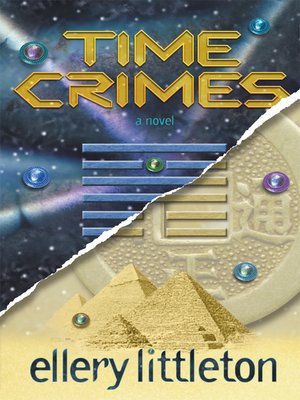
Sign up to save your library
With an OverDrive account, you can save your favorite libraries for at-a-glance information about availability. Find out more about OverDrive accounts.
Find this title in Libby, the library reading app by OverDrive.



Search for a digital library with this title
Title found at these libraries:
| Library Name | Distance |
|---|---|
| Loading... |
I have referred to Time Crimes as a "haiku novel." It is short, compressed and
poetic, and allows a lot of space for readers to imagine and reflect. The narrative
moves along quickly; one reader commented that it is "like a film script, in that it
has a tight plot and sharply delineated characters."
Time Crimes is a blend of science fiction, crime thriller, love story and meditation
on the meaning of time. In the course of the novel, some of the main characters
travel back to the past and back to the future - not once, but three times!
But as much as it is about time, Time Crimes is about the I Ching, also known as
The Book of Changes. This ancient book has served as a source of divination for
the Chinese for more than 3,000 years. Confucius, along with many other scholars
and philosophers, used the I Ching and added his own interpretations and
reflections.
These contributions, compiled and organized over the centuries, have made the
I Ching what it is today: a unique compendium of Chinese wisdom and tradition,
the common source for both Confucian and Taoist philosophies.
The ancient Chinese had a profoundly different perception of time than we do.
This is reflected throughout the I Ching, which in itself is very preoccupied with
time and its impact on the course of human affairs. In Time Crimes, these very old
ideas are presented in a new context.
The I Ching provides a system of knowledge to help one analyze and understand
the pattern of events and changes in life. Through the 64 hexagrams, the authors
constructed a method to aid in unlocking the secrets of the future and
determining the surest way to live in harmony with prevailing circumstances.
The I Ching emphasizes the cyclical nature of events, and the principle of
"synchronicity," whereby coincidence becomes more than mere random accident.
Moon, the central character in Time Crimes, is an expert in using the I Ching as a
source of guidance and wisdom as he grapples with life's challenges and choices.
It is, he says, like a stern but compassionate grandfather who dispenses good
advice, common sense and caution, while suggesting ways to deal with problems
that emphasize personal integrity and negate confrontation.
"For lovers of self-knowledge, of wisdom," wrote C. G. Jung, the godfather of
contemporary humanistic psychology, "the I Ching seems to be the right book."
One of my favourite of the many comments in the I Ching about time comes from
the first hexagram, "The Creative." When properly understood, it says, time is no
longer a hindrance, but the means of making actual what is potential.
This is a wonderful idea, as it presents time as an ally in the pursuit of
enlightenment, rather than an obstacle.
Ellery Littleton. Victoria, B.C. Autumn, 2004







